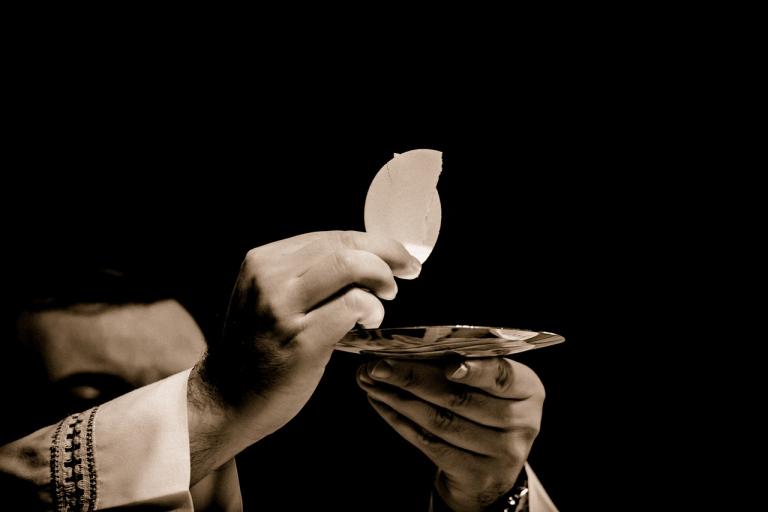Alright, so I’ve just taken a glance at my combox and there are a lot of interesting points that I would like to talk about. I’ve chosen one. Just so people know, at the moment I’m in the final stages of editing my novel and my kids just got off school, so please feel free to discuss among yourselves but be aware that I’m reading comments sporadically at best and probably will be at least until Octavia is in print.
Recently I wrote about how God is indescribable and to a large extent inconceivable. Nathaniel’s comment expresses an atheistic frustration that I think deserves a fair response:
If she can’t conceive or describe it, how does she believe it?
I’ve noticed God has a tendency to morph in conversations. When its confidant Christians speaking to each other, God is easy and obvious to understand. He hates gay sex and voting Democrat, loves people going to church wearing nice clothes and frequently helps out by curing cancer and getting people close parking spaces.
When a Christian is speaking to an atheist, suddenly God becomes this mystical impossible to understand…something that under girds the universe in some way that is specifically immune to the investigation of physicists, and how dare Atheists attack a simplistic straw-God nobody believes in?
TLDR;
Reconcile for me how God can be as you describe it and the God of the “miracle” of Fatima and hating gay sex.
Okay, so a lot of this I can’t really speak to because it addresses a kind of Christianity that I don’t profess. I would probably vote Democrat if I were an American. I’m pretty skeptical about miracles, and usually ignore them because I don’t see them as compelling evidence of anything much. I do occasionally pray about things like parking spaces and finding lost shoes, but I see this as a way of centering my attention on the fact that everything is grace rather than a way of manipulating the universe so that I don’t have to lug my groceries across the parking lot. My wardrobe consists mostly of second-hand blue jeans and geeky t-shirts, and I don’t think the author of all Creation gives a *&%$. I’m also very sympathetic to the reasons why Atheists don’t believe and I value the ways in which the Atheist community holds the Church’s feet to the fire when it comes to self-serving theologies and moral hypocrisy.
I do think it’s important, though, to discuss the reasons why I would bother with a religious institution like the Church. I mean, let’s be real about this: scandals are a more or less constant occurrence, the hierarchy boasts plenty of politically ambitious egoists, a lot of the apologetics for Christianity are embarrassingly awful, a lot of Christian piety is embarrassingly sappy, every conceivable kind of violence and hatred has been practiced by Christians supposedly in the name of God, and today God’s name is invoked to prop up a hideous presidency and a morally bankrupt political party in the US.
So why not just get out?
It has to do with love of neighbour. I came to the conclusion, long before I became a Christian, that being a liberal made one extremely difficult moral demand on me: I had to love people including the kinds of people that I was inclined to despise. For a while I adopted the common liberal belief that you have to tolerate everyone except for the bigots, but it stuck in my craw. There was a built-in hypocrisy, a fundamental contradiction in the system, and I have never been especially happy with that kind of incoherence. It struck me, particularly, that this was a dangerous position to take because one would always face the temptation to define other people’s belief systems as bigoted in order to excuse one’s own intolerance.
Living as I did, in a highly multicultural neighbourhood I was also keenly aware that there was a strong risk of Western supremacy in this kind of liberalism. There was a tension, for example, between my commitment to uphold the religious freedom of my Muslim classmates and my knee-jerk reaction to anything that they said in class that was actually informed by Islam. I finally resolved the conflict in favour of a more radical kind of tolerance — one in which you try to undermine bigotry gently, lovingly, without allowing yourself to invoke the mantra of “tolerance” or “diversity” as a subtle means of othering people whose beliefs differ from your own. Obviously I’ve never practiced this perfectly because it’s an insanely exacting standard, but I do think it stands as one of the foundational principles of my moral stance.
You have to love everyone. Period. No exceptions. Because as soon as you allow exceptions of any kind, for any reason, no matter how seemingly just, you give your psyche the excuse it needs to foment hate. And if human history teaches us nothing else it teaches us that humans are very, very good at hate.
So, this is a big part of what informs my relationship to the Church. Catholicism, as I see it, is defined by universality — the word “catholic” literally means just that. It’s an organization that has been formed by billions of people living over the course of two millennia (not to mention the Jewish folks who gave us our Scriptures, and the Greeks and Romans whose cultures so heavily informed our early theology.) To my knowledge it’s the largest and longest-standing single institution on the planet whose primary purpose is to seek the Good, the Beautiful and the True. But it’s made up of humans. And humans are terrible and wonderful creatures whose hearts encompass both the most sublime dignity, and also the most hideous depravity.
And so it is with our fumbling after Truth. We do it badly. Whether alone or in groups we make horrible mistakes. Whether we believe in God or reject him, we find ways to excuse our own worst impulses. We mount crusades and we build gulags, we burn heretics and we manufacture atomic bombs. And the worst of it is, we find ways to convince ourselves that these activities are actually good.
However, this realistic vision of humanity’s moral qualities notwithstanding, I’m basically a humanist. I think that we are capable of progress, and that the best way to do this is by working together in co-operation with one another. Any single person, no matter how well-meaning, stands constantly at risk of mistaking their own psychological preferences for virtue, their own ideological convictions for truth, their own aesthetic tastes for beauty. Only the whole humanum united stands a chance of really approaching the central mystery Who Is God. So for me religion must include a communal dimension, and must ideally do so through a community that admits the widest possible variety of cultures, personality types, strengths and weaknesses, ideologies and philosophies, inviting all into communion in the common pursuit of truth and love.
Which is why I can’t fault the Church for admitting and providing for all kinds of people whose spiritualities, opinions and behaviours I find alienating, strange or just plain wrong. No universal body can exist without the kind of exacting and uncomfortable diversity that I think the love of humanity demands. Being a Catholic means that every week I have to go and intimately share the communion table with people who would vote for Donald Trump. With people who think that God hates gays. People who think that the Virgin Mary is appearing at Medjugorje. People who think that being an ass in comboxes is a good way to proclaim Christ. People who think women who wear pants to Mass are going to hell. And with people who thought God’s Not Dead II was a good Christian film. At regular intervals I have to directly remind myself that these too are my brothers and sisters: vessels of truth, bearers of beauty, beloved of God, no less than myself.
As a Catholic, I’m constantly reminded that I can’t just go around excommunicating people that irritate me from equal standing with me in the communion of humankind. I’m continually called back to the difficult work of reconciliation, forgiveness, acceptance, the gentle correction of error and the patient bearing of wrongs. And I have to do this in the context of a blatantly flawed institution where love has to be practiced not as an abstract principle, but as a concrete and exacting discipline. One which includes loving those who love badly, those who love confusedly, and even those who call hatred “love” and take the name of Love in vain.
Image credit: pixabay
Stay in touch! Like Catholic Authenticity on Facebook:













